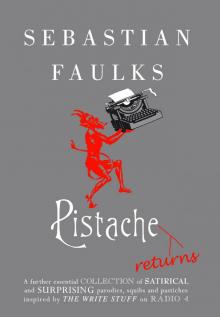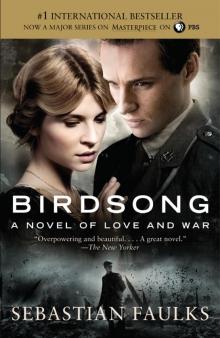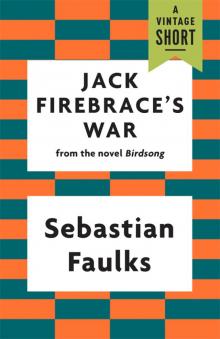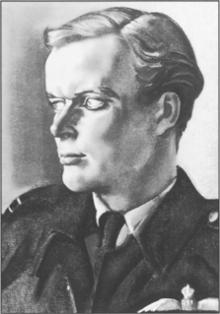- Home
- Sebastian Faulks
Jack Firebrace's War Page 2
Jack Firebrace's War Read online
Page 2
John’s face was now in his mind quite brightly: the wan, solitary boy at the tail of the street gang, the stumbling baby with his troublesome steps. He could hear his piping London voice with its parrot greetings and unfounded optimism. He pictured his boy in the high-ceilinged hospital ward with the yellow smudge of gas lamps, the starched headdresses of the nurses, and the smell of soap and disinfectant.
Sleep came to him like an unseen assailant. It was not the sinister light of the ward but the lamps of a huge bar in a pub on Lea Bridge Road: the men in suits and flat caps, smoke rising, ale glasses held aloft. There were other pictures, end to end: the kitchen of his parents’ house in Stepney; a park, a dog; the lit pub again, thronged with people; John’s face, the dear boy. He was aware of a great temptation being offered, some ease of mind, some sleep for which he would sell the lives of his comrades, and he embraced the offer, not aware that he was already slumbering, head slumped forward, cradled between the aching shoulders that had dug out French earth for hours without respite.
He did not know he was asleep until he was awake again, feeling himself slump forward as a boot cracked into his ankle.
“What’s your name?” It was an officer’s voice.
“Firebrace, sir.”
“Oh, it’s you, Firebrace.” He recognized Captain Weir’s surprised tone.
“Were you asleep?” The first officer’s voice was cold.
“I don’t know, sir. I just wasn’t listening and—”
“You were asleep on duty. It’s a court-martial offence. See me tomorrow at six. Your sergeant will bring you. You know the punishment.”
“Yes, sir.”
Jack watched the two men walk on and swing left at the end of the firebay, the red ends of their cigarettes glowing.
He was relieved by Bob Wheeler, another tunneller. He went back to find Tyson and Shaw asleep beneath their wooden frame. There was no room for him with them, so he took a handful of cigarettes from his pack and went back down the communication trench, past the halfhearted challenge of a sentry. He climbed over the back of the support trench and found himself in an area where piles of ammunition and supplies lay strapped under tarpaulin in the drizzle. There was a group of men, including a sergeant, on guard nearby and he went to make himself known to them. He told them he was going to the latrines, and they let him pass.
He found a tree that had not been damaged by shellfire and sat down beneath it, lighting a cigarette and sucking in the smoke. Before the war he had never touched tobacco; now it was his greatest comfort.
If he was found guilty by court-martial he could be shot. The tunnellers had become more and more part of the army; although they had not undergone the humiliating drills and punishments handed out to the infantry before they were deemed ready to fight, they had lost the separate status they had had at first. When Jack had arrived at Ypres with his fellow-Londoners Allen and Mortimer, he was told they would spend the war there while different divisions of infantry came and went, but to begin with they found themselves in a constant and bewildering state of movement, the very trouble the organization had been designed to prevent. They had become soldiers and were expected to kill the enemy not only by mining but with bayonet or bare hands if necessary.
This was not the life Jack had envisaged when he volunteered. At the age of thirty-eight he could reasonably have avoided service, but he had no work in London. Margaret was ten years older than he was and had enough to do looking after John. She managed cleaning jobs from time to time, but the money was not enough for them. Jack didn’t think the war would last long; he told Margaret he would be home within the year, having saved half his pay.
She was a practical woman of Irish descent who was drawn to Jack by his humour and his kindliness. They had met at the wedding of one of her eight sisters, who was marrying a workmate of Jack’s. At the party after the service Jack was drinking beer and doing conjuring tricks for a group of children. He had a big, square face with hair parted in the middle. She liked the way he talked to the children before he began joking with the other men who had come along to see their friend married.
“I’m an old maid,” she told Jack when he went round to visit her a week later. “You don’t want to be walking out with me.” But he seemed to know exactly what he wanted and they were married three months later.
Lighting another cigarette beneath his tree, listening to the screech of a shell going over the British line about half a mile south, Jack Firebrace began to tremble.
He had thought himself immune to death; he thought he had hardened himself against it, but it was not so. If they found him guilty they would take him alone at daybreak to some secluded place behind the lines—a glade in a forest, a yard behind a farm wall—and shoot him dead. They would ask members of his own unit, miners and diggers, men who had not even been trained to fire on the enemy, to do the job. Some would have blanks and some would not; no one would know whether the fatal shot had been fired by Tyson or Shaw or Wheeler or Jones. He would fall like the millions of the dead who had gone down into the mud: baker’s boys from Saxony, farm labourers from France, and factory workers from Lancashire, so much muscle and blood in the earth.
He could not look on this possibility without shaking. When there was a battle or a raid, they expected to die; it was the losses through sniper fire, through shells and mortars, the blowing of the tunnel, the continuous awareness that any moment could bring death in a number of different ways that had been harder to understand. Slowly Jack had become accustomed even to this. It took him a day of sleep each time they went into rest before he could adjust to not being in constant fear; then he would begin to laugh and tell stories in the surging relief that overcame them. The indifference he had cultivated, however, was to the extermination of the enemy, his colleagues, and his friends; he was not, he now admitted to himself, indifferent to the prospect of his own death.
He held his face in his hands and prayed to God to save him. There was no task he wanted to complete, no destiny by which he felt impelled: he merely wanted to see Margaret again. He wanted to touch John’s hair. My son, he thought, as he sat in the rain, my darling boy. It would make no difference to the outcome of the war whether he himself lived or died; it made no difference whether today it was Turner whose head was blown from his body, or whether tomorrow it was his or Shaw’s or Tyson’s. Let them die, he prayed, shamefully; let them die, but please God let me live.
Through the night he sat unchallenged and alone, forcing his exhausted mind to bring out memories of his life, pictures of what he had done that might go with him and comfort him if he had to face the line of rifles pointed at his head. There were games of football on Hackney Marshes, the comradeship of workers on the construction of the London Underground; odd faces and voices from childhood; his son. There was nothing to make it seem a life worth saving. In the end his memory offered him only fragments of early childhood: sitting in front of the kitchen range, the smell of his mother as she kissed him in his bed. With them came a desire to sleep, to surrender.
He stood up and stretched his stiff arms and legs, then slunk back to his position in the trench and crept in beside Tyson and Shaw. Shortly before dawn he went to look for Sergeant Adams.
“Come along, then,” said Adams. “Smarten yourself. Get your belt on straight.”
He was not the kind of sergeant most men feared. He had a mocking sense of humour and seldom shouted. The men privately admired him.
“I’ve heard all about you, sleeping on the job,” he said.
Jack said nothing. He was ready to die.
“You may be lucky. Some of these young officers blow hot and cold. Mr. Wraysford is the strangest one I’ve seen. Law unto himself. This way.”
Adams walked him down a narrow trench in the rear of which were several dugouts. He pointed to an entrance at the end of the line and told him to go down on his own.
Jack looked up at the rim of the world that was appearing through the grey light: the burned a
nd blasted trees, the once-green fields now uniformly brown where all the earth had been turned by shells. He was reconciled to leaving it.
He went down the wooden ladder and found a gas curtain across a homemade door. He knocked and waited.
A voice told him to come in and he wrenched the door open. There was a strong smell of kerosene inside. Pipe smoke obscured the contents of the room. Jack was able to make out a wooden bunk in the lower half of which a figure lay hunched in sleep, and a makeshift table and chairs. It was better made than most of the squalid arrangements he had seen, though the primitive boarding that made the walls and the tinker’s use of odd cups, candles, wicks, and nails to do duty for missing essentials gave it a primitive appearance.
“Who are you?” He was addressed by a lieutenant, who was one of two officers sitting at the table. The other was Jack’s own company commander, Captain Weir, on a visit to the infantry.
“Firebrace, sir. You told me to report to you at six this morning.”
“Why?”
“I was asleep on sentry duty.”
The officer stood up and walked over to where Jack was standing. He brought his face up close. Jack saw a man with dark hair that was going grey at the sides; he had a thick moustache that obscured his upper lip and big brown eyes that stared thoughtfully at him. He might have been any age from twenty-five to forty.
“I have no recollection at all.”
“I think you were going to put me on a charge, sir.”
“I don’t think I could do that. You’re not in my unit. You’re a tunneller, aren’t you?”
“Yes, sir.”
“One of yours, Weir.”
Jack looked toward Weir and noticed the almost-empty bottle of whisky that stood on the table. There were only two glasses.
“Sit down, Firebrace. Have a drink,” said Weir.
“No thank you, sir. If I—”
“Sit down anyway.”
Jack looked round. He didn’t want to sit on a chair that might belong to the officer commanding the infantry, an irascible man called Gray whom he had heard giving orders. He wondered where he was: bullying the sentries, perhaps.
Jack took the chair that Weir kicked toward him. Weir was back in his soft shoes and white sweater. He looked unshaven and his eyes were bloodshot. Jack looked down, afraid to meet his gaze. Also on the table were five playing cards laid out in the shape of a star, face down, with thin trails of sand between them. In the centre of the formation was a carved wooden figure and a stump of candle.
“This is Lieutenant Wraysford,” said Weir. “His platoon is next to your section in the line. His are the men we are protecting against mines. Last night he had two men out in a listening post. Perhaps he was worried about them. Is that right, Wraysford?”
“No. Brennan and Douglas would be all right. They know what they’re doing.”
“Don’t you want to talk to this man?” said Weir.
“I would if I could remember who he was.” He turned to Jack. “There’ll be some tea in a minute if you don’t want whisky. I’ll tell Riley to make an extra cup.”
As Jack’s eyes grew accustomed to the smoky dugout he saw that parts of the walls were covered with fabric. It looked like expensive foreign silk or cotton. On top of a small locker were more wooden carvings of human figures. There were no photographs on the bookshelves in the corner, though there were some amateurish sketches of heads and bodies. He became aware that the lieutenant had been following his gaze.
“Do you draw?” he said.
“A bit,” said Jack. “I don’t get enough time now. Or the quiet.”
A tray with three mugs of tea was brought in by Riley, a small grey-haired man in neat batman’s uniform. He reached up to a bag suspended from the ceiling, out of range of rats, and produced some sugar.
Jack watched the lieutenant go over to the shelves and take down a sketch. “The human anatomy is extraordinarily simple,” he said. “The construction of the legs for instance: two long bones with a simple joint for flexing, and the proportions always the same. But when you draw them it’s difficult to suggest the shape. Everyone can see this muscle on the thigh, the quadriceps. I never knew there was another one here, inside, the sartorius. But if you emphasize it too much the figure looks muscle-bound.”
Jack watched the lieutenant’s finger trace the lines of the leg on the drawing as he spoke. He was not sure whether the man was teasing him, extending his agony, or whether he really wanted to talk about drawing.
“Of course,” the lieutenant said with a sigh, “the war has provided all of us with daily lessons in anatomy. I could write a paper on the major organs of the British private soldier. Liver in section. Bowel, extent of, when eviscerated. The powdery bone of the average English subaltern.”
Jack coughed. “Excuse me, sir. Can I ask about the charge?”
“The charge?”
“For God’s sake, Wraysford,” said Weir. “You told this man to report to you because he was asleep. He wants to know if you are going to have him court-martialled. He wants to know if he’s going to have an art lesson or whether he’s going to be shot.”
“There’s no charge. You are not under my command.”
Jack felt a hot stinging in his eyes.
“I’m sure your own company commander will punish you if he wants to.”
Weir shook his head. “No further action.”
“Thank you, sir. Thank you.”
Jack looked at the two men with love and gratitude. They understood the difficulties of a man who had been stretched too far. He felt sure that their mercy sprang from compassion for him. He took out Margaret’s letter. In his enthusiasm for living he wanted to share the burden of his son’s illness.
“You see here, sir. I had this letter from my wife. Our boy’s been taken poorly. I was worried for him. I’d not slept when I came up from the tunnel, I was so worried about him.”
He handed the letter to Weir, who nodded. “See this, Wraysford?” he said, pushing it across the table.
“Yes,” said Stephen. “I see it. Diphtheria, it says. That’s serious.”
“Will I be allowed leave to go and see him?”
Stephen raised an eyebrow toward Weir. “I doubt it. We’re undermanned as it is,” said Weir.
Jack said, “Have you got children, sir?”
Weir shook his head. “Not married.”
“You, sir?”
“No,” said Stephen.
Jack nodded a few times to himself. “I suppose it’s funny when I’m out here with men getting killed all round me and it’s him that’s in danger.”
Stephen said, “Every one of the men we’ve killed is someone’s son. Do you think of that when you see them dead? Do you wonder what their mothers thought when they first held them to their breast—that they would end like this?”
“No, sir. I hadn’t thought of it like that.”
The three men drank their tea. From outside came the whining of shells. They could feel the reverberation of the explosion in the dugout. Fragments of dried earth fell from the ceiling.
Stephen said, “Two of my men were in a shellhole listening for eight hours last night in no-man’s-land. What do you think they were thinking about all that time? It’s not as if they’re allowed to talk.” He was looking at Jack.
“I don’t know, sir. Perhaps it’s like when we’re in the tunnel. You stop thinking at all after a bit. It’s as though you’ve stopped living. Your mind goes dead.”
“I’d like to go down your tunnel,” said Stephen.
“No you wouldn’t,” said Weir. “Even the miners don’t like it.”
“I’d like to see what it feels like. Some of my men think you don’t work fast enough down there. They think you don’t hear the noise of the enemy. They’re terrified of being blown up from underneath.”
Weir laughed. “We know that all right.”
Jack shifted in his chair. There was something strange about the two officers. He suspected the
y were drunk. He had always thought of Weir as dependable. Like all the tunnelling company commanders, he was a regular engineer who had been transferred. He was careful and reliable underground, even though he had had no experience of it before the war. But his eyes looked wild and red with whisky. The brownish stubble on his cheeks and chin was surely the result of more than one morning’s missed shave. The lieutenant, Jack thought, looked more sober, but in some ways even stranger. You could not be sure whether he was serious. He seemed forgetful and distant, but also enthusiastic about going underground. It was as though he was not all there, Jack thought. The affection and gratitude he had felt at first began to evaporate. He didn’t want to share any more of his personal feelings with them. He wanted to be back with Tyson and Shaw, or even Wheeler and Jones with their irritating chatter. At least with them he would know where he was.
“Any idea when we’ll get some rest, sir?” he asked Weir.
“Tomorrow, I should think. They couldn’t keep us here longer than that. What about your men, Wraysford?”
Stephen sighed. “God knows. I hear rumours all the time from battalion headquarters. We will have to attack sooner or later. Not here, though.”
“Are we going to have to lose a few lives just to placate the French?” Weir laughed.
“Yes. Oh, yes. They want to feel they’re not alone in this. But I believe they will reap the whirlwind.”
Riley appeared from the back of the dugout. “It’s nearly six, sir. Stand-to in ten minutes.”
“You’d better go, Firebrace,” said Weir.
“I’ll see you in that tunnel,” said Stephen.
“Thank you, sir.”
Jack climbed back out of the dugout. It was almost light outside. The low sky of Flanders met the earth at a short horizon, only a few miles behind the German lines. He breathed in deeply on the morning air. His life had been spared; the last trace of elation came to him as he looked toward the back of the trench and saw the plumes from cigarettes and steam from the tea that cold hands were now clasping. He thought of the stench of his clothes, the lice along the seams, the men he was frightened to befriend in case their bodies came apart the next day in front of his eyes. It was the hour of Tyson’s ablutions, when he would empty his bowels into a paintpot and throw the contents over the top.

 Devil May Care
Devil May Care Pistache Returns
Pistache Returns The Girl at the Lion D'Or
The Girl at the Lion D'Or Pistache
Pistache Jeeves and the Wedding Bells
Jeeves and the Wedding Bells A Week in December
A Week in December The Vintage Book of War Stories
The Vintage Book of War Stories Engleby
Engleby Birdsong
Birdsong Jack Firebrace's War
Jack Firebrace's War Where My Heart Used to Beat
Where My Heart Used to Beat A Possible Life
A Possible Life The Fatal Englishman: Three Short Lives
The Fatal Englishman: Three Short Lives On Green Dolphin Street
On Green Dolphin Street Charlotte Gray
Charlotte Gray A Broken World: Letters, Diaries and Memories of the Great War
A Broken World: Letters, Diaries and Memories of the Great War Human Traces
Human Traces The Fatal Englishman
The Fatal Englishman A Broken World
A Broken World Paris Echo
Paris Echo War Stories
War Stories Girl At the Lion d'Or
Girl At the Lion d'Or